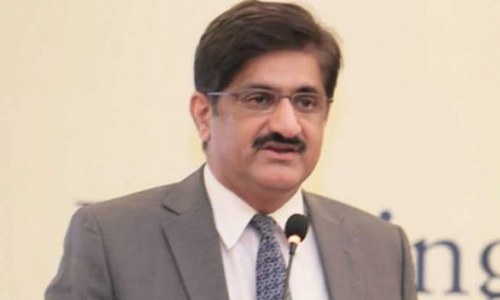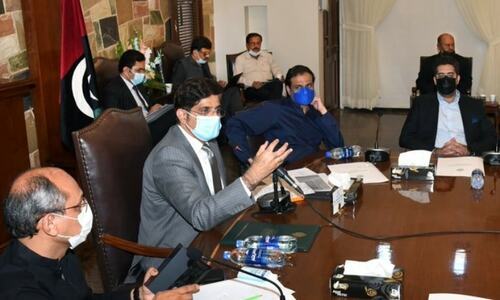AWAY from the noisy rallies and street politics elsewhere, members of Chief Minister Murad Ali Shah’s team in Sindh remain busy making reports, circulating agendas, pushing files, shuttling between departments, exchanging notes or discussing current affairs. The fact is that they are perhaps a bit too busy within the confines of their offices to really see where the province is headed.
There is no dearth of those who insisted, while talking to Dawn, that a change was in the offing, as the provincial cabinet “fortnightly reviews and tracks development project, removes irritants and streamlines timely funding to ensure timely completion”.
There is no dearth of those who think otherwise. “I am not sure who are they fooling around with. Being insiders, they should know better. Had the PPP been serious in improving the living conditions in its base province, 13 years was sufficient time to deliver,” said a disgruntled officer shunted out of the inner circle of the provincial hierarchy. “The delusional lot secretly wishes for a miracle that may set everything right.”
To his credit, Chief Minister Shah has displayed the skill to deliver where and when he wanted. He pleasantly surprised the nation last year with a sound scientific approach, evidence-based planning and effective management capabilities in handling the Covid challenge. He set the tone that earned him the appreciation of global forums, and his approach was later adopted by the centre and other federating units. In collaboration with the National Control and Command Centre (NCOC), he succeeded in establishing a fairly efficient network of inoculation centres across the province.
Other than the blame-the-centre approach by the officials, there is no dearth of those who see a lot of good happening and, likewise, there is no dearth of those who think otherwise
But there is to management than Covid alone, some argue. “Sindh seems frozen in history. The economy has been stagnant in comparison to Punjab and KP. The province has actually regressed in certain key sectors, such as the provision of safe drinking water and public transport.
“No one can contest the widening development gap between Sindh and Punjab. The biggest province has its own set of problems, but there has been for sure an incremental pace of development irrespective of the government in power for the past 40 years. It can’t be an accident that most social indicators in Sindh are trailing those in Punjab,” said an observer who lamented the removal of Hyderabad and Sukkur from the list of 10 biggest cities of Pakistan. Except for the three provincial capitals, the list has cities only from Punjab.
With such a sharp difference of opinion, where does one draw the line as a performance marker for Sindh? Chief Minister Shah was approached for his comments, but the response did not reach Dawn till the filing of this report.
Playing down the absence of credible data on the state of the provincial economy, officials tend to pass on the blame to the federal government. “With deep ethnic divisions in society, Sindh is not an easy province to govern. There are a host of factors holding Sindh back, but the federal government’s hostility and interference aggravate the situation. Besides, the slow and insufficient federal transfer of funds to Sindh disrupts the provincial government’s plans and projects,” a senior officer argued anonymously.
During the first three-and-a-half months of the ongoing fiscal, Sindh received about nine per cent less than the committed funds from the federal government. According to details, gleaned from the updated official documents available with Dawn, Sindh received Rs230.1 billion till October 15 against the proportionate transfer target of Rs253.6bn, posting a shortfall of Rs23.5bn. In 2021-22 the federal government has committed to transfer Rs869.6bn to the province.
In the July-Sept quarter, Sindh spent Rs234bn of its annual budget of Rs1.6 trillion. It spent Rs191bn of a total Rs1.13tr on account of recurring expenditure, and Rs43bn of the Rs516bn annual development budget.
Observers and businessmen in urban Sindh, not particularly fond of the ruling party, were confused by the government’s handling of the health challenge. It is baffling that a team with the proven capability of managing natural calamities fails so miserably in fulfilling its basic responsibility of providing basic amenities to the people, many of them argue.
In a private conversation a while back, Mr Shah stressed that there was a huge scope to improve the quality of public service delivery and the accessibility of civic amenities. He simply smiled when asked what was stopping him. Smile over, he repeated the political blame-the-centre line of argument.
Some analysts find the business community biased. “There is always room for improvement, but critics must not forget that the party has repeatedly been elected by the very people the detractors believe it failed. The PPP must be doing something right to maintain its vote bank. More than anything, the party has failed to project its good work. It definitely needs to do better in the provincial capital, but one must not forget that there is Sindh beyond Karachi where the party has its roots rather deep,” argued an analyst.
He, however, conceded that more needed to be done. “There is no defence for neglecting people and their needs. The PPP has ruled the province for 18 out of the past 30 years. It can’t be absolved of the responsibility for what passes on as life in much of the province. The party will have to put its act together or risk losing ground under its feet in its home province,” he asserted.
A business leader who had vowed before the 2008 elections not to support Asif Ali Zardari or his party even with a knife pressing his throat, however, has diluted his stance. He urged the ruling party to pay attention to the demands of the traders and the industrialists “for the future of the province”.
Published in Dawn, The Business and Finance Weekly, November 1st, 2021















































